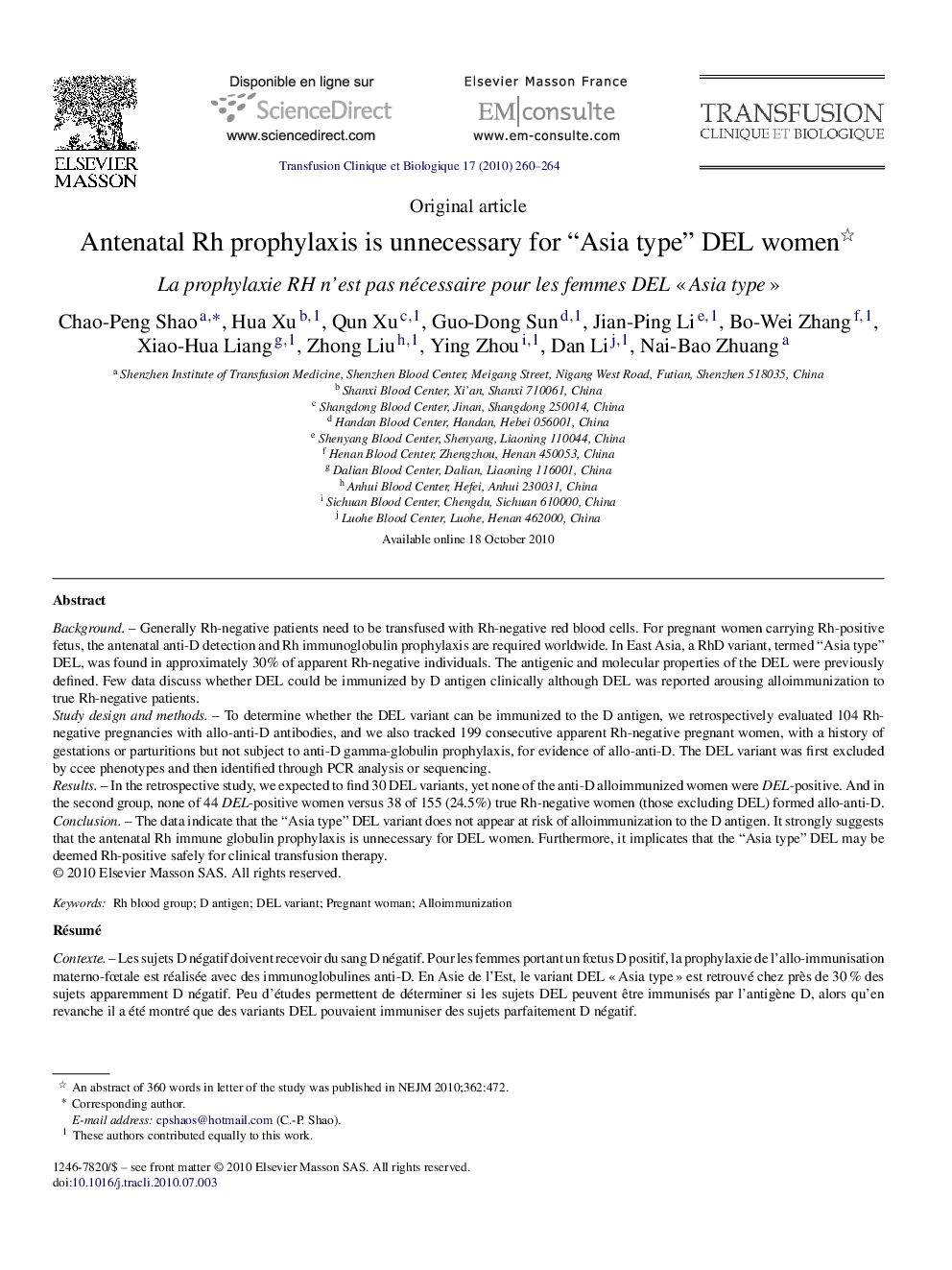| کد مقاله | کد نشریه | سال انتشار | مقاله انگلیسی | نسخه تمام متن |
|---|---|---|---|---|
| 1105846 | 954209 | 2010 | 5 صفحه PDF | دانلود رایگان |

BackgroundGenerally Rh-negative patients need to be transfused with Rh-negative red blood cells. For pregnant women carrying Rh-positive fetus, the antenatal anti-D detection and Rh immunoglobulin prophylaxis are required worldwide. In East Asia, a RhD variant, termed “Asia type” DEL, was found in approximately 30% of apparent Rh-negative individuals. The antigenic and molecular properties of the DEL were previously defined. Few data discuss whether DEL could be immunized by D antigen clinically although DEL was reported arousing alloimmunization to true Rh-negative patients.Study design and methodsTo determine whether the DEL variant can be immunized to the D antigen, we retrospectively evaluated 104 Rh-negative pregnancies with allo-anti-D antibodies, and we also tracked 199 consecutive apparent Rh-negative pregnant women, with a history of gestations or parturitions but not subject to anti-D gamma-globulin prophylaxis, for evidence of allo-anti-D. The DEL variant was first excluded by ccee phenotypes and then identified through PCR analysis or sequencing.ResultsIn the retrospective study, we expected to find 30 DEL variants, yet none of the anti-D alloimmunized women were DEL-positive. And in the second group, none of 44 DEL-positive women versus 38 of 155 (24.5%) true Rh-negative women (those excluding DEL) formed allo-anti-D.ConclusionThe data indicate that the “Asia type” DEL variant does not appear at risk of alloimmunization to the D antigen. It strongly suggests that the antenatal Rh immune globulin prophylaxis is unnecessary for DEL women. Furthermore, it implicates that the “Asia type” DEL may be deemed Rh-positive safely for clinical transfusion therapy.
RésuméContexteLes sujets D négatif doivent recevoir du sang D négatif. Pour les femmes portant un fœtus D positif, la prophylaxie de l’allo-immunisation materno-fœtale est réalisée avec des immunoglobulines anti-D. En Asie de l’Est, le variant DEL « Asia type » est retrouvé chez près de 30 % des sujets apparemment D négatif. Peu d’études permettent de déterminer si les sujets DEL peuvent être immunisés par l’antigène D, alors qu’en revanche il a été montré que des variants DEL pouvaient immuniser des sujets parfaitement D négatif.Conception de l’étude et méthodesAfin de déterminer si les sujets DEL peuvent être immunisés par l’antigène D, nous avons analysé rétrospectivement 104 femmes enceintes produisant un anti-D et nous avons recherché la présence d’un anti-D chez 199 femmes apparemment D négatif, ayant eu plusieurs grossesses sans prophylaxie par immunoglobulines anti-D. Le variant DEL a d’abord été exclu chez les femmes de phénotype ddccee, puis identifié par PCR et séquençage.RésultatsDans l’étude rétrospective, le variant DEL n’a été retrouvé chez aucune des femmes produisant un anti-D, alors que la fréquence attendue de ce variant est de 30 % chez les sujets D négatif. Dans le second groupe, aucune des 44 femmes retrouvées DEL positif n’a produit d’anti-D alors que 38 femmes non DEL sur 155 ont produit un anti-D.ConclusionCes données indiquent que le variant DEL « Asia type » ne représente pas un risque d’allo-immunisation anti-D pour son porteur. En conséquence, ces résultats suggèrent fortement que la prophylaxie anti-D dans le cadre de la grossesse n’est pas nécessaire chez les femmes DEL « Asia type ». La transfusion de globules rouges D positif à des sujets DEL « Asia type » peut aussi s’envisager sans risque d’allo-immunisation.
Journal: Transfusion Clinique et Biologique - Volume 17, Issue 4, October 2010, Pages 260–264